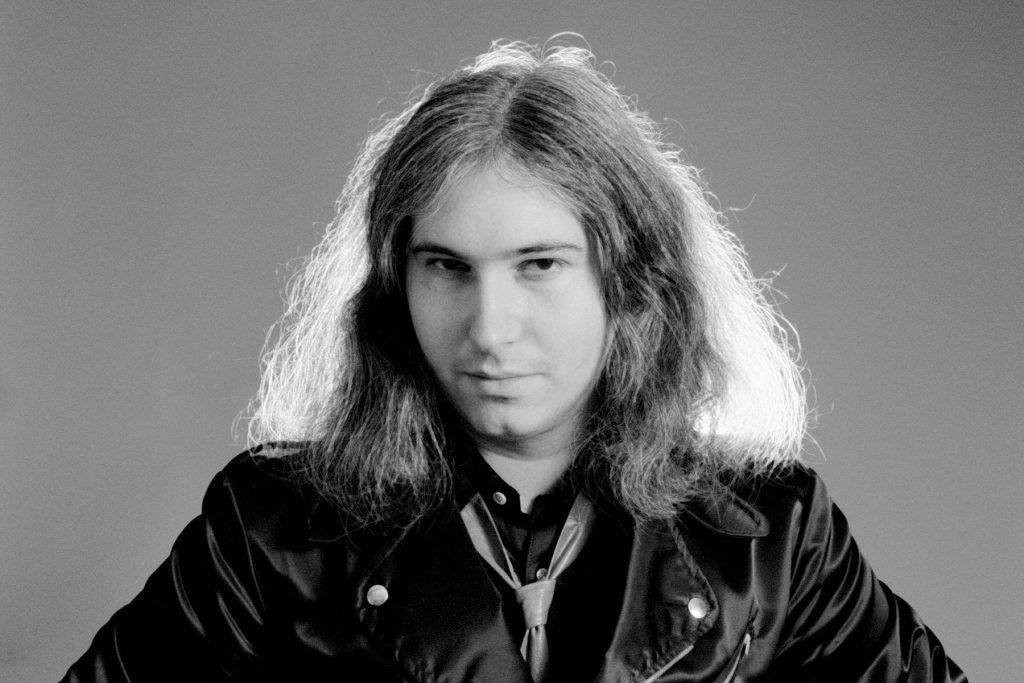
From Meat Loaf to Celine Dion: 10 Essential Jim Steinman Songs
Jim Steinman is best known, with good reason, for the songs he wrote for Meat Loaf’s epic Bat Out of Hell. But his aural footprint on pop wasn’t limited to that singer and that 1977 album. As it turned out, Steinman’s songs were equally at home in the two decades that followed, when an astounding array of pop acts — from Air Supply to the Sisters of Mercy — performed his songs. The resulting discography amounts to an alternate-universe Wall of Sound, with Steinman as the Phil Spector of the Eighties and Nineties. Following the songwriter’s death on Monday at the age of 73, here are 10 of his best.
Meat Loaf, “I’d Do Anything for Love (but I Won’t Do That)”
Meat Loaf seemed like just about the last artist on earth likely to score a Number One hit at the height of the grunge era in 1993. But he reunited with Jim Steinman that year for the long-delayed sequel to Bat Out of Hell, and the leadoff single, “I’d Do Anything for Love (but I Won’t Do That),” was so undeniably brilliant that radio stations all over the world embraced it. The LP version clocks in at a Steinman-esque 12 minutes, but it was chopped down to a mere 5:03 for radio. Even in truncated form, the song pulsates with heartache, lust, and mystery. All these years later, people are still wondering what exactly the singer wouldn’t do for love. Jim Steinman never told. A.G.
Bonnie Tyler, “Total Eclipse of the Heart”
“Total Eclipse of the Heart” is Jim Steinman at his most awesomely bombastic, with the famous hook, “Turn around, bright eyes!” It was a 1983 Number One hit for the Scottish singer Bonnie Tyler, whose previous U.S. hit had been the Seventies folk-rock ditty “It’s a Heartache.” Steinman gave her a chance to belt, with a mini opera that spiraled through about six climaxes. Long as the song is, no DJ ever dares to fade it out early, because everybody’s favorite moment comes at the very end: Backup singer Rory Dodd chiming in to give Bonnie Tyler one more high-pitched “Turn around, bright eyes.” R.S.
blogherads.adq.push(function () {
blogherads
.defineSlot( ‘medrec’, ‘gpt-dsk-tab-article-inbody1-uid0’ )
.setTargeting( ‘pos’, [“mid-article”,”mid”,”in-article1″,”mid-article1″] )
.setSubAdUnitPath(“music//article//inbody1”)
.addSize([[300,250],[620,350],[2,2],[3,3],[2,4],[4,2]])
;
});
Celine Dion, “It’s All Coming Back to Me Now”
What do you do when you set out to write the most romantic song ever? Put Celine Dion in a gothic castle and make sure all the windows are dramatically wide open at all times. Steinman always envisioned a woman singing this iconic power ballad, so he denied giving it to Meat Loaf (who later recorded it anyway) and offered it to his female group Pandora’s Box. But Dion made it a hit, belting the lines in the video as she danced in a gown surrounded by looming mirrors and the memory of a leather-clad lover. The song was influenced by Wuthering Heights — where the wildness of the moors is mirrored in the wildness of Heathcliff’s character — and the dead coming to life. “It’s like Heathcliff digging up Cathy’s corpse and dancing with it in the cold moonlight,” Steinman said. “You can’t get more extreme, operatic, or passionate than that.” A.M.
Jim Steinman, “Bad for Good”
Jim Steinman originally conceived his 1981 LP, Bad for Good, as Meat Loaf’s follow-up to Bat Out of Hell, but when the singer suffered significant vocal problems, he decided to simply record the tunes himself and release it under his own name. He may have lacked Meat Loaf’s pipes, but the title track is still a masterpiece. Had Meat been able to sing it himself back in ’81, his career in the MTV era might have played out very differently. As it was, Bad for Good was a commercial flop, and Steinman never released another solo album. In 2006, Meat Loaf finally recorded “Bad for Good” on his own. A.G.
Bonnie Tyler, “Holding Out for a Hero”
For the massively successful soundtrack for the 1984 film Footloose, screenwriter Dean Pitchford worked with a diverse array of songwriters to set the tone for the classic blockbuster. Steinman’s contribution was the deliciously camp “Holding Out for a Hero,” a track so big that it makes a scene where two tractors play chicken feel unrepentantly urgent. The song was written before they had a singer in mind, and it was Steinman who recommended Tyler. She dramatically sought out the “streetwise Hercules” he imagined for her, and the pair proved to be a consistent match made in rock-anthem heaven. “Holding Out for a Hero” wasn’t an immediate success, but it’s become a pop-culture and karaoke staple, appearing in movies like Shrek 2 and Angry Birds. B.S.
Meat Loaf, “Paradise by the Dashboard Light”
Steinman set out to make the ultimate song about sex in a car and he easily delivered with the epic “Paradise by the Dashboard Light.” Off Bat Out of Hell and sung by Meat Loaf with Ellen Foley, “Paradise” is a horny, over-the-top tale of a young couple preparing to “go all the way tonight.” Told in three parts (four, if you count the radio-style baseball play-by-play of the deed getting done), the eight-and-a-half-minute track follows the lusty pair from the moment their night begins to heat up to Foley’s character begging to know if her partner loves her in the afterglow. Of course, the night doesn’t go exactly as planned: Meat Loaf’s character regretfully caves in to the profession of love and ends the song “praying for the end of time.” It’s part Springsteen-ian teenage suburban fantasia, part Andrew Lloyd Webber. Steinman is at his funniest, cheekiest, and most ambitious here, with his singers gleefully relishing in the challenge. B.S.
The Sisters of Mercy, “More”
Steinman’s late-Eighties and early-Nineties work with British goth rockers Sisters of Mercy was proof that his shamelessly over-the-top aesthetics could elevate just about any genre. The band first teamed up with him on 1987’s “This Corrosion” — where frontman Andrew Eldritch told the producer he was after a “disco party run by the Borgias” — which became their first U.K. Top 10 hit. For 1990’s Vision Thing, Steinman came back on board to co-write and co-produce “More,” which blended Eldritch’s sinister baritone with huge hair-metal guitars and wailing background vocals, resulting in a brilliantly campy paean to the pleasures of excess. “[He] really knows how to make a wonderfully stupid record. Totally outrageous,” Eldritch once said of Steinman. “Every time you think to yourself, do we really want to go this far, and you say to Jim, ‘Jim, are you sure about this?’ and anybody else will go, ‘Don’t do it!’ Jim goes, ‘More! More! More people, singing!’ It works.” H.S.
Meat Loaf, “Two Out of Three Ain’t Bad”
The most magical things result from listening to Elvis, and for Steinman, it was “Two Out of Three Ain’t Bad.” The Bat Out of Hell highlight was born after Steinman heard “I Want You, I Need You, I Love You” on the radio, and applied its simplicity to Meat’s booming heartbreak — resulting in icicles instead of tears. “Meat has Elvis in him,” Steinman said in 2003. “I mean, I’ve never seen him with a peanut-butter-and-banana sandwich, but he’s the closest thing to an Elvis. And I loved Elvis.” A.M.
blogherads.adq.push(function () {
blogherads
.defineSlot( ‘medrec’, ‘gpt-dsk-tab-article-inbody2-uid1’ )
.setTargeting( ‘pos’, [“mid-article2″,”mid”,”in-article2″,”mid-article”] )
.setSubAdUnitPath(“music//article//inbody2”)
.addSize([[300,250],[300,251],[620,350],[2,4],[4,2],[3,3]])
;
});
Air Supply, “Making Love Out of Nothing at All”
The story goes that Steinman wrote this 1983 power ballad for Meat Loaf, but Loaf’s record company didn’t want to foot the bill for him record it. So “Making Love Out of Nothing at All” landed with Air Supply, the Australian duo of singer Russell Hitchcock and songwriter-guitarist Graham Russell. “Russell loved the song straightaway, and so did I,” Graham Russell told a New Zealand music website in 2019. “And then the chance to work with Jim was a great one. But he is a little weird.” Pejoratively dismissed as “soft rock” by some, the “little weird” Steinman added serious bite to Air Supply’s recording by enlisting a pair of E Streeters and Bat Out of Hell alumni for the muscular production: Max Weinberg on drums and Roy Bittan on the song’s glorious piano intro. The producer’s masterstroke, however, was a ripping guitar solo by Rick Derringer, who would later rope Steinman in to writing a song for Hulk Hogan on the 1985 Derringer-produced novelty The Wrestling Album. Frequent Steinman collaborator Bonnie Tyler released her own version of “Making Love” in 1995. J.H.
Barry Manilow, “Read ‘Em and Weep”
Hardly anyone noticed this song when it appeared on Meat Loaf’s Dead Ringer, but a few years later, Steinman revived it — with tweaked lyrics — for a Manilow compilation. As incongruous as the alliance sounded at the time, it worked. Manilow was always at his glorious best when he took it way over the top, so he couldn’t have been more at home with Steinman’s rolling-thunder production and cinematic lyrics (“I’ve been trying for hours just to think of what exactly to say/I thought I’d leave you with a letter or a fiery speech/Like when an actor makes an exit at the end of a play”). Utterly unapologetic in wanting a hit in the MTV era, Manilow threw himself into the song, especially the chorus, as if it had been written for him to begin with. He didn’t write this song, either, but he still made you cry. D.B.




